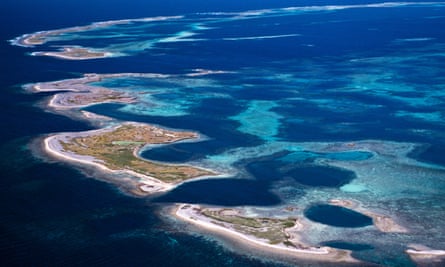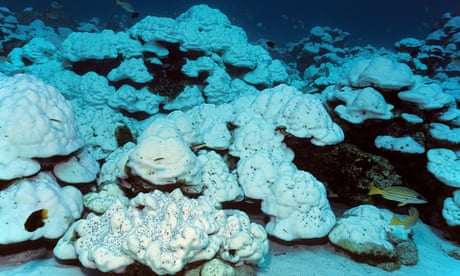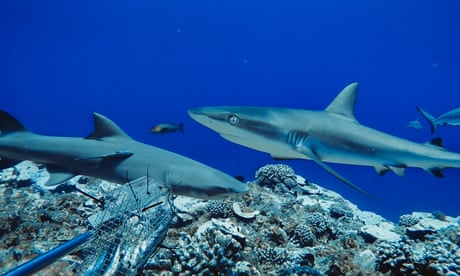https://www.theguardian.com/environment/2020/aug/13/marine-food-webs-could-be-radically-altered-by-heating-of-oceans-scientists-warn
Marine food webs could be radically altered by heating of oceans, scientists warn
Temperature and CO2 changes reduce the numbers of some species and promote the growth of algae, University of Adelaide study finds

Heating of the world’s oceans could radically reorganise marine food webs across the globe causing the numbers of some species to collapse while promoting the growth of algae, new research has warned.
Healthy marine food webs that look like a pyramid, with smaller numbers of larger predatory species at the top and more abundant smaller organisms at the bottom, could become “bottom heavy”.
The types of species that could become less abundant in the oceans are the same ones targeted by commercial fishing and also are socially and culturally important to many communities around the globe.
In the research, published in the journal Science, researchers at the University of Adelaide recreated a marine habitat in a series of 1,800-litre tanks and then subjected some to temperature and CO2 changes.
Prof Ivan Nagelkerken, of the University of Adelaide’s Environment Institute and who led the research, said gazing into the tanks after six months when the study period ended had not been a pretty sight.
“It looked bad,” he said.
After being subjected to higher temperatures and higher CO2 the rocks, he said, were overgrown with turf algae and the sandy bottom had a lot more slimy algae that is toxic to some species.
The tanks recreated a habitat off the coast of Adelaide in Gulf St Vincent that was about six metres deep.
Many of the species placed into the tanks – including kelp, crustaceans and the multitude of different bacteria on rocks, sand and in sediment – were gathered from the gulf. Native fish and crabs were also added.
Some 12 tanks of ocean water – known as mesocosms – were split into four groups. Temperature and CO2 levels were not adjusted in one group. In another three tanks, the water temperature was raised over the course of six weeks until they were 2.8C higher than today.
Another group of tanks had their CO2 levels adjusted to the equivalent of 910 parts per million in the atmosphere, causing the water to become less alkaline. The habitat in the fourth group of tanks was treated to both higher temperatures and higher levels of CO2.
Both the CO2 conditions and the temperatures reflect conditions expected towards the end of this century in a world where little is done to curb fossil fuel burning.
Nagelkerken said the results of the experiment remained relevant even if the world did act to slow down the rising levels of CO2 in the atmosphere.
In 2011 a marine heatwave in Western Australia raised ocean temperatures more than 2C for about 10 weeks. A study five years later found no recovery of the kelp – a vital component shaping the marine ecosystem there.
Nagelkerken said: “That marine heatwave showed that even over just a few weeks, that caused the kelp to disappear.”
He said the research showed that ocean heating “reshuffles species communities” with weedy plants and algae thriving but the “abundance of other species, especially invertebrates, collapses”.
He said the changed pyramid that was fatter at the bottom and thinner in the middle, could eventually see larger predators also losing out.
In the study, the researchers write: “The top of food webs may eventually become depleted under future climate conditions or additional human disturbances.”
The small fish that were the predators in the tank resisted the impacts of warming, but the experiment showed the food they ate was becoming impoverished – an imbalance that could see the top predators struggling.
An ecological tipping point could be reached where the “the top of the food web can no longer be supported,” the study says.
Nagelkerken told the Guardian that in the real world, the impacts would vary depending on whether species could move to different areas. Some species would not be able to.
He said there was already evidence species were extending their ranges away from the equator as oceans got warmer and this, together with changes to the food webs, could also see traditional fishing grounds move, creating knock-on effects for communities that had been built around fishing.
He added: “It’s not just climate change, but also our removal of predatory fish [through overfishing] and the addition of nutrients into the ocean. We have to consider all of that too.”
Dr Kirsty Nash, of the Institute for Marine and Antarctic Studies at the University of Tasmania, who was not involved in the research, said studying the resilience of marine systems was challenging, and the researchers had struck a balance between what was practically possible while giving an insight into real-world impacts.
She said: “Developing this type of understanding is really important if we want to then address questions around the broader consequences of climate change for society, for example, are fisheries likely to suffer as a result of climate change.”
The experimental findings in the tanks, she said, were likely only showing an “intermediate state” that was a prelude to the development of “radically different” food webs.
She said many places in the world had fish that societies consumed but that the study suggested would be impacted.
“These local fish are popular eating fish, so this would have implications for what’s available, but it does depend on the area and how culturally and socially acceptable that would be.”
Dr Sophie Dove, an associate professor at the University of Queensland, who has run large long-term mesocosm experiments, said the study adds to mounting evidence that under the current trajectory of CO2 emissions “services will be lost from our most valued ecosystems”.
She said she would have preferred that the experimental conditions had more closely mirrored the daily and seasonal changes in light, temperature and CO2.
But she said the experiment demonstrated that organisms at the bottom of the food chain – such as “relatively inedible slimy alga” like cyanobacteria – did well under the changing conditions, but small plants that helped give rocky reefs their structure “do very badly under warming and acidification”.
68 days to save the Earth …
… we’re all in. Are you? On November 4, a day after the presidential election, the US will formally withdraw from the Paris agreement on constraining global heating. It’s urgent that we tell the world what this means, and the Guardian is pulling out all the stops to do so. Will you help us by supporting our journalism?
Millions are flocking to the Guardian every day. Financial support from our readers is crucial in enabling us to produce open, fearless, independent reporting that addresses the climate emergency. It helps sustain the freedom we have to present the facts comprehensively, explain the details as they unfold, and interrogate the decisions made.
The Guardian recognises the climate emergency as the defining issue of our times. That’s why we have pledged to give climate change, wildlife extinction and pollution the sustained attention and prominence they demand, as a core part of our journalism.
At this pivotal moment for our planet, our independence enables us to always inform readers about threats, consequences and solutions based on scientific fact, not political prejudice or business interests. This makes us different. And we are equally determined to practice what we preach: we have divested from the oil and gas sectors, renounced fossil fuel advertising and committed to achieving carbon neutrality by 2030.
We believe everyone deserves access to information that is fact-checked, and analysis that has authority and integrity. That’s why, unlike many others, we made a choice: to keep Guardian reporting open for all, regardless of where they live or what they can afford to pay. Our work would not be possible without our readers, who now support our work from 180 countries around the world.
Every reader contribution, however big or small, is so valuable for our future. Support the Guardian from as little as $1 – and it only takes a minute. Thank you.


沒有留言:
張貼留言